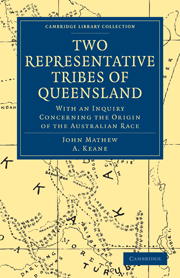 Two Representative Tribes of Queensland
Two Representative Tribes of Queensland Book contents
- Frontmatter
- Contents
- LIST OF ILLUSTRATIONS
- INTRODUCTION
- PREFACE
- CHAP. I INQUIRY CONCERNING THE ORIGIN OF THE AUSTRALIAN RACE
- CHAP. II THE COUNTRY OF THE KABI AND WAKKA TRIBES
- CHAP. III PHYSICAL AND MENTAL CHARACTERS
- CHAP. IV DAILY LIFE—SHELTER—FOOD—CLOTHING
- CHAP. V MAN-MAKING AND OTHER CEREMONIES
- CHAP. VI DISEASE AND TREATMENT—DEATH—BURIAL AND MOURNING
- CHAP. VII ART—IMPLEMENTS—UTENSILS—WEAPONS—CORROBOREES
- CHAP. VIII SOCIAL ORGANISATION
- CHAP. IX THE FAMILY—KINSHIP AND MARRIAGE
- CHAP. X RELIGION AND MAGIC
- CHAP. XI MYTHS AND LEGENDS
- CHAP. XII LANGUAGE
- VOCABULARY
CHAP. X - RELIGION AND MAGIC
Published online by Cambridge University Press: 29 August 2010
- Frontmatter
- Contents
- LIST OF ILLUSTRATIONS
- INTRODUCTION
- PREFACE
- CHAP. I INQUIRY CONCERNING THE ORIGIN OF THE AUSTRALIAN RACE
- CHAP. II THE COUNTRY OF THE KABI AND WAKKA TRIBES
- CHAP. III PHYSICAL AND MENTAL CHARACTERS
- CHAP. IV DAILY LIFE—SHELTER—FOOD—CLOTHING
- CHAP. V MAN-MAKING AND OTHER CEREMONIES
- CHAP. VI DISEASE AND TREATMENT—DEATH—BURIAL AND MOURNING
- CHAP. VII ART—IMPLEMENTS—UTENSILS—WEAPONS—CORROBOREES
- CHAP. VIII SOCIAL ORGANISATION
- CHAP. IX THE FAMILY—KINSHIP AND MARRIAGE
- CHAP. X RELIGION AND MAGIC
- CHAP. XI MYTHS AND LEGENDS
- CHAP. XII LANGUAGE
- VOCABULARY
Summary
The relation of religion to magic has, in recent years, assumed an immense importance, thanks largely to the writings of Dr J. G. Frazer and Dr Andrew Lang. Dr Frazer holds that religion is the outcome of despair in the efficacy of magic, and as the Australians are all firm believers in magic and habitually practise it, he necessarily asserts that they have not yet arrived at the stage which discards magic for religion.
Had the Kabi and Wakka tribes any religion? Our answer depends upon our definition of religion. If we accept Dr Frazer's definition, which makes the offering of propitiatory rites to supernatural beings an essential element, the conclusion, perhaps, must be that these tribes were destitute of religion. I say perhaps, because although I never heard from the natives of rites which could be called propitiatory, yet there may have been rare and informal examples of such rites. For instance, in Victoria, a sorcerer was in the habit of cutting off some of his own hair, and this, greased with some kidney fat of a human victim, whom he had murdered some time previously, he would cast into the River Murray to purchase the favour of a water spirit. And Mrs D. M. Bates has shown that the blacks in the south-west of West Australia throw rushes and branches upon certain sacred spots to mollify the spirits that haunt them.
- Type
- Chapter
- Information
- Two Representative Tribes of QueenslandWith an Inquiry Concerning the Origin of the Australian Race, pp. 167 - 178Publisher: Cambridge University PressPrint publication year: 2010First published in: 1910


